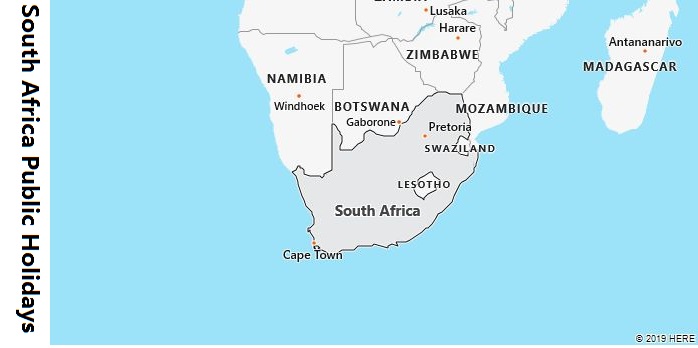South Africa Public Holidays
South Africa Public Holidays
Searching for the national holidays in South Africa? All public holidays in South Africa are treated like Sundays. This means that most of the South Africa employees have a day off and all schools are closed on these office holidays. If you are planning a trip to South Africa and want to know what the national and regional holidays are, check the details in the tables below.
South Africa is a country with a rich history and diverse cultural heritage, reflected in its public holidays. These holidays celebrate historical events, religious observances, and cultural festivals that have shaped the nation. Public holidays in South Africa serve as a reminder of the country’s journey from apartheid to democracy, the unity in its diversity, and the importance of various religious and cultural traditions.
National Public Holidays
1. New Year’s Day (January 1st)
New Year’s Day marks the first day of the year in the Gregorian calendar and is celebrated by all South Africans, regardless of cultural or religious background.
Significance
- Celebrates the beginning of the new year and symbolizes fresh starts, new opportunities, and aspirations.
- A time for reflection on the past year and setting resolutions for the year ahead.
Celebrations
- Families and friends gather for meals, often in the form of barbecues (braais) or outdoor picnics.
- In urban areas, fireworks displays are common, particularly in major cities like Johannesburg, Cape Town, and Durban.
- Many people attend religious services to pray for blessings and success in the coming year.
- Beach outings and recreational activities are popular, especially along the coastal regions.
2. Human Rights Day (March 21st)
Human Rights Day is a significant public holiday in South Africa, commemorating the Sharpeville Massacre of 1960 and honoring the broader struggle for human rights in the country.
Significance
- Marks the day in 1960 when 69 people were killed during a peaceful protest against apartheid pass laws in Sharpeville.
- A day to remember the sacrifices made by those who fought for freedom, equality, and human dignity.
- Highlights the importance of the South African Constitution, which guarantees the protection of human rights for all citizens.
Commemorations
- National events are held, including speeches by government officials, community leaders, and activists.
- Memorial services at Sharpeville and other significant sites, where the massacre is remembered.
- Cultural performances and exhibitions are organized, celebrating South Africa’s progress in human rights.
- Educational programs are held to raise awareness of the ongoing need to protect human rights.
3. Good Friday (Varies)
Good Friday is a Christian holiday observed by many South Africans, commemorating the crucifixion of Jesus Christ. It is part of the broader Easter celebration and is one of the most solemn days in the Christian calendar.
Significance
- A day of mourning and reflection on the suffering and death of Jesus Christ.
- Christians reflect on the themes of sacrifice, redemption, and the hope of salvation.
Observances
- Church services are held nationwide, often featuring prayers, hymns, and sermons focused on the Passion of Christ.
- Many people observe fasting or abstain from meat as a sign of penance.
- In some communities, processions reenacting the Stations of the Cross are performed.
- Good Friday is typically a quiet day, with businesses closed and people spending time with family or in quiet reflection.
4. Family Day (Varies, the Monday after Easter Sunday)
Family Day follows Easter Sunday and is an extension of the Easter holiday, giving South Africans a long weekend to spend with family and loved ones.
Significance
- Encourages family bonding and time spent together in a relaxed and celebratory atmosphere.
- Highlights the importance of family in South African culture and society.
Celebrations
- Families gather for meals, often outdoors, enjoying picnics, braais, or beach outings.
- Popular vacation spots see an influx of visitors taking advantage of the long weekend.
- In rural areas, extended families come together for reunions, strengthening family ties.
- Community events and outdoor activities, such as sports and music festivals, are common.
5. Freedom Day (April 27th)
Freedom Day is one of the most important public holidays in South Africa, marking the first democratic elections held in the country in 1994, which signaled the end of apartheid.
Significance
- Celebrates the birth of a democratic South Africa, where all citizens, regardless of race, could vote for the first time.
- Honors the struggle for freedom, equality, and justice, and the role of figures like Nelson Mandela and Desmond Tutu.
Commemorations
- National events are held across the country, with the main celebration typically taking place in Pretoria, where government leaders deliver speeches.
- Wreath-laying ceremonies at monuments and memorials dedicated to the anti-apartheid struggle.
- Concerts, cultural performances, and exhibitions showcasing South Africa’s diverse cultures and the journey to freedom.
- Schools and community centers hold educational programs focused on South Africa’s history and the significance of democracy.
6. Workers’ Day (May 1st)
Workers’ Day, also known as May Day, is a public holiday dedicated to celebrating the achievements and rights of workers in South Africa and around the world.
Significance
- Recognizes the contributions of workers and labor movements to the development of the country.
- Highlights the importance of labor rights, fair wages, and safe working conditions.
Celebrations
- Trade unions and labor organizations often organize marches and rallies to raise awareness of workers’ rights and advocate for better working conditions.
- Political speeches and debates are held, focusing on labor issues, unemployment, and economic justice.
- Workers’ Day is also a day of rest for many, with families taking time off to relax and enjoy social gatherings.
7. Youth Day (June 16th)
Youth Day is an important public holiday that commemorates the 1976 Soweto Uprising, in which thousands of students protested against the apartheid government’s education policies. The day is now dedicated to South Africa’s youth and their role in the country’s future.
Significance
- Honors the bravery and sacrifice of the students who stood up against the apartheid regime.
- Focuses on the issues facing South Africa’s youth today, including education, unemployment, and social justice.
Commemorations
- Government-hosted events, including speeches and memorial services, particularly in Soweto.
- Youth organizations and schools hold rallies and discussions focused on youth empowerment and leadership.
- Cultural events, concerts, and exhibitions celebrate youth culture and creativity.
- Educational programs and workshops aimed at addressing the challenges faced by young people in South Africa.
8. National Women’s Day (August 9th)
National Women’s Day celebrates the role of women in South African society, commemorating the 1956 Women’s March against apartheid pass laws. It highlights the ongoing struggle for gender equality and women’s rights.
Significance
- Celebrates the contributions of women to the anti-apartheid movement and their role in building a democratic South Africa.
- Raises awareness of issues such as gender-based violence, inequality, and the need for women’s empowerment.
Commemorations
- Wreath-laying ceremonies and speeches at the Women’s Monument in Pretoria, where the march took place.
- Events celebrating women’s achievements in various fields, including politics, business, and the arts.
- Women’s organizations hold marches, discussions, and workshops focused on gender equality and women’s rights.
- Many communities host cultural events showcasing the role of women in traditional and modern society.
9. Heritage Day (September 24th)
Heritage Day is a celebration of South Africa’s diverse cultures, languages, and traditions. It is a day for South Africans to reflect on their collective heritage and celebrate their unity in diversity.
Significance
- Celebrates South Africa’s cultural diversity, acknowledging the country’s many ethnic groups, languages, and traditions.
- Encourages national pride and unity, recognizing that South Africa’s strength lies in its diversity.
Celebrations
- Traditional dress, music, dance, and food are central to Heritage Day celebrations, with people embracing their cultural roots.
- Schools, businesses, and communities organize cultural exhibitions, performances, and workshops showcasing South Africa’s diverse heritage.
- Many people celebrate with braais, leading to the day being unofficially referred to as “National Braai Day.”
- Museums, heritage sites, and cultural centers host special events and tours to educate the public about South Africa’s history and cultural legacy.
10. Day of Reconciliation (December 16th)
The Day of Reconciliation was established in 1995 to foster reconciliation and unity after the end of apartheid. The date holds historical significance for both the Afrikaner and African communities, as it commemorates the Battle of Blood River in 1838 and the formation of Umkhonto we Sizwe, the armed wing of the African National Congress, in 1961.
Significance
- Aims to promote national unity, healing, and reconciliation after the divisions of apartheid.
- Encourages South Africans to work towards a future of peace and understanding.
Commemorations
- Government-hosted events and ceremonies focused on promoting reconciliation and social cohesion.
- Reconciliation marches, dialogues, and community-building activities across the country.
- Cultural performances, art exhibitions, and festivals that celebrate unity in diversity.
- Educational programs addressing the importance of reconciliation and the role of citizens in building a better future.
11. Christmas Day (December 25th)
Christmas Day is a Christian holiday celebrating the birth of Jesus Christ, widely observed by many South Africans. While it is primarily a religious holiday, it has also become a time for family gatherings and festive celebrations.
Significance
- Celebrates the birth of Jesus Christ, central to the Christian faith.
- Emphasizes themes of love, giving, and peace, which resonate with people across the country.
Celebrations
- Church services are held across South Africa, often including nativity plays, carols, and prayers.
- Families gather for festive meals, typically featuring roasted meats, salads, and desserts like trifle.
- Many South Africans exchange gifts and spend time with loved ones.
- In urban areas, Christmas decorations, lights, and public events create a festive atmosphere.
12. Day of Goodwill (December 26th)
The Day of Goodwill, observed the day after Christmas, provides an opportunity for South Africans to relax and spend time with family and friends. It is also a day focused on charity and giving.
Significance
- Encourages acts of kindness and goodwill towards others, particularly the less fortunate.
- A day for rest and relaxation after the Christmas festivities.
Celebrations
- Many people spend the day with family, often continuing their Christmas celebrations.
- Community events focused on charity and giving are organized, with donations being made to those in need.
- Outdoor activities such as picnics, braais, and beach outings are popular.















































